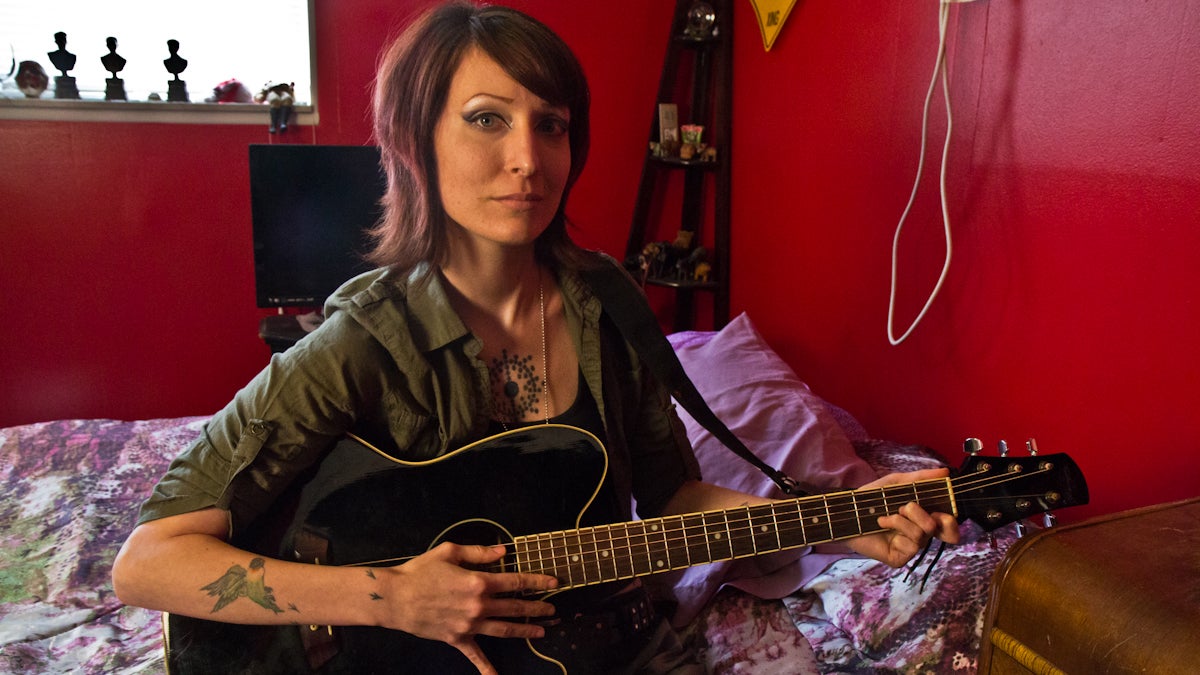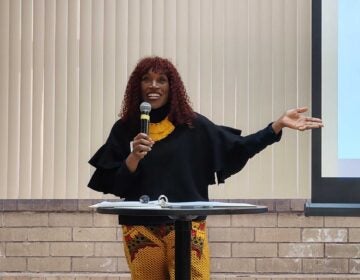South Philly musician owns disability, independence with new album [video]

Kelianne Murray, or Anomie Fatale has Ehlers-Danlos Syndrome, a connective tissue disorder that plagues her nerves. (Kimberly Paynter/WHYY)
Musician Anomie Fatale chose her name deliberately. At age 20 she lost control of most of her body. She’s turning that pain and frustration into activist-flavored art. And it’s inspiring.
“Anomie” is a term of social nihilism. She explains its meaning. “One who’s been cut from society and doesn’t apply to any standards and norms. It’s how I feel about being disabled.”
Born Kelianne Murray, Fatale has Ehlers-Danlos Syndrome, a connective tissue disorder that plagues her nerves. “I’m not fully paralyzed,” she said. “I can move my fingers, and I still have nerve pain.”
Hear her tell her story, as produced by Todd Bookman of WHYY’s The Pulse
‘I am Great Neck’
Sometimes, taking a look at the cards someone else has been dealt can be a humbling exercise in perspective. I’ve never woken up from experimental surgery to find my head locked in a downward position — an inconvenient side effect that the doctors neglected to mention. I’ve never been prevented from entering a home or a business because of a single step.
“I’ve had a lot of brain and spine surgeries,” she said, and there’s been an unforeseen consequence every time. “I’ve never had a successful surgery.”
She had to drop out of Stockton University, near Atlantic City. She can’t work (much). She was once homeless as a result of her disabilities.
Yet she explains her situation with patience and levity. On her website, she refers to herself as a “musician, model, and medical experiment.” I don’t know how she doesn’t let rage consume her. Her music has become an effective outlet, and now she’s about to release a new record, “I am Great Neck.” And it’s beautiful.
Independent in music
The somewhat moody, gloomy 12-track LP has icy-cool and slinky textures. It came about as a result of Fatale finally landing a place to live in North Philly and losing the band she’d worked with for years, called Great Neck, after the town in New York where surgery first failed her. All alone in public housing, she picked up a guitar at a pawn shop, and she got to writing.
“I told myself I was never going to play guitar, because my hands don’t work right,” she said. But then she met someone with a similar lack of bodily control who nonetheless performed as a one-man band. “He plays [guitar] on his lap and holds it so it’s easier for him to play,” she said.
With her old band, she’d write lyrics and melodies and hum guitar parts; but she gets along now writing songs without them. “The album itself is about a time in my life when I became independent with my living situation, and my first time independent in music, as well,” she said.
“Finding that independence and embracing it and doing it the way I want to do it — it’s been an interesting journey.”
Freedom from the ‘Prison of Care’
Fatale, who now lives in South Philly, talked about the new record, which she is debuting on Sunday at a release party at Connie’s Ric Rac in the Italian Market.
She wrote the song “Prison of Care” about the way the system can feel rigged against folks who need in-home care or housing support. “I’m still able to do a lot of things but need help with some basics,” she said. “But to get attendant care and housing, it’s a war. Most people don’t even know this problem exists.”
The track “Angels in the Ghetto” is an eye-opener and a stunner of a story. When she lived in public housing, fires broke out frequently. One night she got some help from an unexpected hero.
“I had never even met this guy before, and he helped me down all six flights of stairs and then went up and got my cat for me. I was really freaked out,” she said. After he helped her, he went back in and got his grandfather. “Seriously, people are amazing, and there are some really good-hearted people in the world. I am forever grateful.”
One track, “No Pedophiliac,” almost got her in trouble with music site CD Baby. They wanted her to change the name of the song because of a perceived reference to pedophilia. Not the case, argues Fatale. It’s about a long-time friend who she loved fraternally and romantically. They were children together.
“It’s saying that you can’t stay in love with a childhood memory. We were in love with each other but never together,” she explains. She has fond memories of that childlike love, and as an adult, she’s still kind of in love with him as a boy. “It has nothing to do with pedophilia at all.”
And “Ballad Of MadDomme” is a tribute to her attendant care worker. “I’d had a couple attendants before her, but she was my attendant first and my friend second,” she said. But she has a wonderful if remarkably intimate relationship with this one, her confidant, and a woman who happens to dabble in dominatrix work. (Hence the title.)
“You can say it’s a job, but you’re truly caring for a person. We have such a bond,” she said. “She helps me feel like myself. She can think for me when I can’t think. She’s my body. That’s what I tell everyone.”
That makes Fatale the brains. But sometimes, she admits, she doesn’t feel like being the brains. “I don’t want to be the brains today — can you be the brains?”
—
Anomie Fatale performs at Connie’s Ric Rac on Sunday, April 10, at the “I am Great Neck” album release party, 3 p.m. – 6 p.m.
WHYY is your source for fact-based, in-depth journalism and information. As a nonprofit organization, we rely on financial support from readers like you. Please give today.




